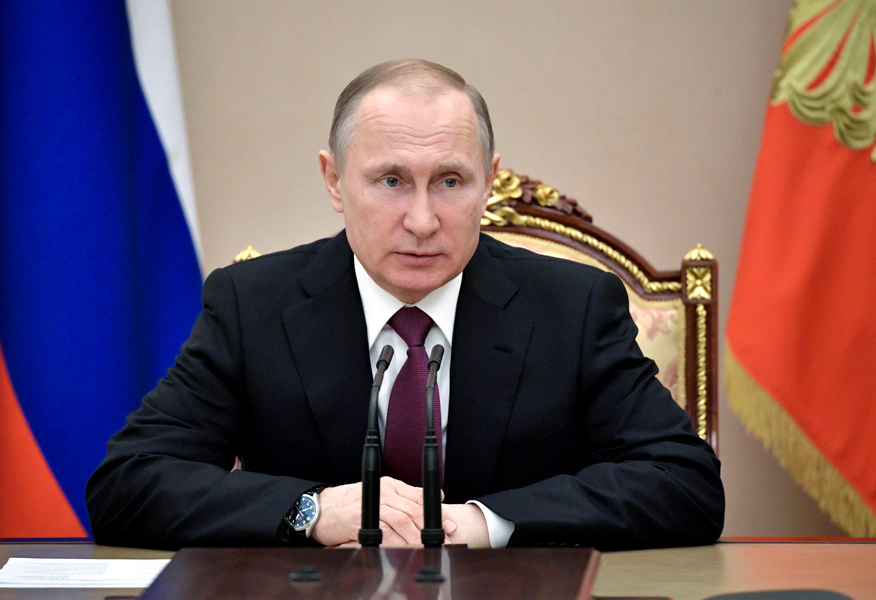U.S. Cites Russia for Banned Missile
 Russia has violated the Intermediate-Range Nuclear Forces (INF) Treaty by deploying ground-launched cruise missiles (GLCMs), a senior U.S. military official told Congress, escalating a dispute over the same type of missile that the Obama administration in 2014 accused Russia of illegally producing and flight testing.
Russia has violated the Intermediate-Range Nuclear Forces (INF) Treaty by deploying ground-launched cruise missiles (GLCMs), a senior U.S. military official told Congress, escalating a dispute over the same type of missile that the Obama administration in 2014 accused Russia of illegally producing and flight testing.
Air Force Gen. Paul Selva, vice chairman of the Joint Chiefs of Staff, publicly confirmed news reports, attributed to unnamed U.S. officials, that Russia had fielded the new missile, known as the SSC-8. “We believe that the Russians have deployed a land-based cruise missile that violates the spirit and intent” of the INF Treaty, he said at a March 8 hearing by the House Armed Services Committee. “And we believe that the Russians have deliberately deployed it in order to pose a threat to NATO and to facilities within the NATO area of responsibility.”
His testimony provided new ammunition to Russia critics in Congress seeking a strong U.S. countermove by the Trump administration, as Republican lawmakers pressed for action on their proposed legislation for further missile defenses in Europe and U.S. development of a nuclear-capable GLCM in what they present as an effort to pressure Russia to return to treaty compliance.
The dispute endangers a Cold War-era accord that laid the groundwork for major U.S.-Russian treaties limiting strategic nuclear weapons (see here). U.S. President Ronald Reagan and Soviet leader Mikhail Gorbachev signed the INF Treaty in 1987, agreeing to eliminate permanently their entire arsenals of nuclear and conventional ground-launched ballistic and cruise missiles with ranges of 500 to 5,500 kilometers. The treaty prohibits such missiles based on land.
Responding to Selva’s testimony, Kremlin spokesman Dmitry Peskov denied any Russian violation. “Russia has been, remains, and will remain committed to all international obligations, including those arising from the INF Treaty,” he told reporters. “I want to remind you of [Russian President Vladimir] Putin’s words about the fact that Russia sticks to the international obligations, even if in situations where sometimes it doesn’t correspond to Russia’s interests. Russia still remains committed to its obligations, so we disagree and reject any accusations on this point.”
Russia previously has levied its own allegations of treaty violations against the United States, stemming from elements of the Aegis Ashore ballistic missile defense system in Europe and from heavy-strike unmanned aerial vehicles that Russia says fit the treaty’s definition of GLCMs. In November 2016, the United States and Russia held a meeting—the first in 13 years—of the Special Verification Commission (SVC), a forum established by the INF Treaty for dispute resolution.
In 2014 the Obama administration launched a review of U.S. options after determining Russia had flight-tested a GLCM with a range prohibited by the treaty. At a December 2014 hearing held jointly by House Foreign Affairs and House Armed Services subcommittees, Brian McKeon, principal deputy undersecretary of defense for policy, said that potential military response options cover “three broad categories: active defenses to counter intermediate-range ground-launched cruise missiles, counterforce capabilities to prevent intermediate-range ground-launched cruise missile attacks, and countervailing strike capabilities to enhance U.S. or allied forces.” The administration was reviewing “a broad range of options, some of which would be compliant with the INF Treaty, some of which would not be,” he testified.
At the March 8 hearing, Rep. Seth Moulton (D-Mass.) asked, “What is the [new] administration’s plan to deal with what seems like a flagrant violation of a treaty?” Selva replied that the Pentagon has “been asked to incorporate a set of options” during the upcoming Nuclear Posture Review (NPR). “So, it would be premature for me to comment on what the potential options might be for the administration,” he said.
In February, Sens. Tom Cotton (R-Ark.), Ron Johnson (R-Wis.) and Marco Rubio (R-Fla.) introduced legislation that they said would allow the United States to “take steps to bring Russia back into compliance with the INF Treaty” that include developing similar missile systems that the United States could deploy. Reps. Ted Poe (R-Tex.) and Mike Rogers (R-Ala.) introduced companion legislation in the House. The legislation “makes clear that Russia will face real consequences if it continues its dangerous and destabilizing behavior,” Rubio said in a statement.
Gary Samore, executive director for research at the Belfer Center for Science and International Affairs at Harvard University’s Kennedy School of Government, said Russia’s INF Treaty violation “frees us from any obligation” to abide by the accord. Still, U.S. responses, such as a decision to deploy systems now banned by the treaty, may limited due to opposition from European allies, he told the Senate Armed Services strategic forces subcommittee on March 8.
“It’s important to recognize that there would be some political cost to doing that, especially in Germany and the Netherlands and other countries,” he said. “This would be controversial, so we need to weigh the military benefits of deploying systems, if they’re necessary, against the potential political complications and figure out a strategy for overcoming those political complications.”
